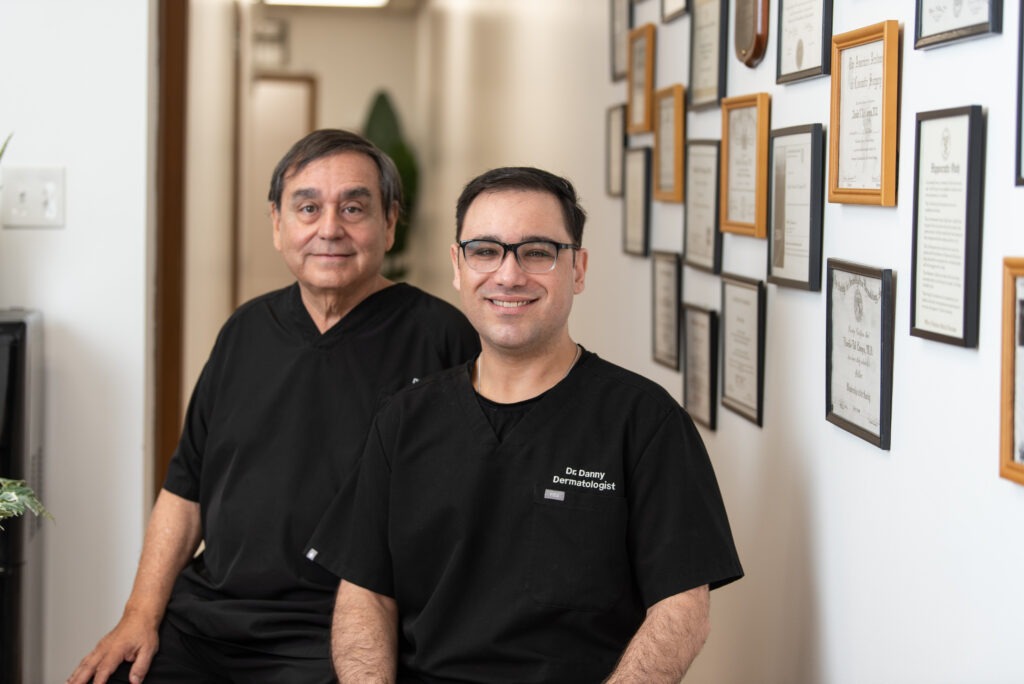Is it a dry scalp, or is it dandruff? If you’ve been asking yourself this question lately, don’t worry; you’re not alone. Despite popular belief, the two terms are not interchangeable, and it can be hard to figure out which one you have when you don’t know what to look for. Chicago Skin Clinic is here to help end the dry scalp vs. dandruff debate so that you can start seeking relief.
The Dry Scalp Myth
A dry scalp occurs when the skin on your head gets dehydrated and thirsty. It’s like when you forget to water a plant, and its leaves droop. But instead of leaves, you have skin that gets flaky, itchy, and sometimes a bit tight. It’s not the most fun feeling in the world.
If the definition sounds pretty much like the name, what could the misconception be about dry scalp? Well, many people believe that dry scalp is a condition when, in reality, it is a symptom of various conditions. Saying you have “dry scalp” as if it were your diagnosis would be like saying you were diagnosed with dry legs when you actually have contact dermatitis! Dry legs would just be one of the symptoms of contact dermatitis.
There are many reasons why you might be suffering from a dry scalp. The quickest, most accurate way to know for certain what’s causing your dry scalp and other symptoms is to visit a board-certified dermatologist like Dr. Danny or Dr. Del Campo at Chicago Skin Clinic! With a thorough examination and maybe some testing, they’ll be able to get to the bottom of your situation and help you come up with solutions!
So, What Is Dandruff?
Our skin is home to tiny organisms, including Malassezia. When this yeast grows too much, you can get dandruff, a common condition in which dead skin flakes off the scalp. Almost half of all adults have dealt with dandruff at some point!
Dandruff is a mild, localized form of seborrheic dermatitis. Symptoms include red, itchy, flaky, and sometimes dry (dry scalp!) skin. It’s also important to know that while dandruff mostly loves hanging out on our scalps, seborrheic dermatitis can appear on the face, chest, and other oily spots. In more severe cases, seborrheic dermatitis can also cause swelling; dandruff does not.
Fortunately, though dandruff might be a nuisance, with the proper care (and a visit to experts like us), you can manage its symptoms and appearance.

Let’s Bust More Scalp Myths
Myth #1: Contagious
Though some people are embarrassed or grossed out by their itchy, dry scalp or flakey dandruff, there’s no need for anyone to be worried about being contagious! You cannot spread dry scalp or dandruff to another person in any way, except maybe by offering poor skin care advice.
Myth #2: Every Day Is Hair Wash Every Day
Sometimes, people feel the need to wash their hair and scalp every day to diminish their symptoms. While this might help if you have dandruff, it won’t help your dry scalp!
Overwashing your scalp can cause a dry scalp! Medicated washes a few times a week are more effective than daily shampooing.
Our dermatologists can help you choose the best routine to control your symptoms without damaging your skin or hair!
Myth #3: Dandruff & Dry Scalp Are The Same
A dry scalp is a symptom caused by dry skin. Dandruff is a condition that occurs when the skin is overly oily. The two are similar in appearance but not quite the same. They have different causes, accompanying symptoms, diagnoses, and treatments.
Myth 4: Dandruff & Dry Scalp Cause Hair Loss
Dry Scalp: The symptom itself does not cause hair loss, but constant scratching and hair washing can encourage hair loss.
Dandruff: If left untreated, the condition can worsen and eventually lead to hair loss.
In both cases, the hair loss is usually reversible with patience and care.
Myth #5: Dandruff & Dry Scalp Are Caused By Poor Hygiene
Neither are caused by poor hygiene. In fact, a dry scalp can be brought on by too much washing! Additionally, though dandruff can be more noticeable from infrequent washing and treated with more washing, poor hygiene is not what causes it.
Other potential reasons for dry scalp and/or dandruff include age, hormones, stress, fungal infections, skin sensitivity, dry air, lack of oils, underlying medical conditions, lifestyles, and applying oily or drying products to the scalp.
Myth #6: Dandruff & Dry Scalp Have The Same Treatments
Unfortunately, some people believe they do not need a diagnosis because they believe both issues are treated the same way. The truth is that their treatments are not the same!
Potential treatment methods for dandruff include:
- Yeast-Fighting Solutions: Special shampoos and creams can keep Malassezia in check.
- Soothing Creams: Sometimes, the scalp gets a bit irritated. Mild steroid creams come to the rescue, calming things down.
- Non-Steroid Options: There are also non-steroid creams that reduce inflammation.
Treatment Methods For Dry Scalp
- Moisture Boost: Hydrating shampoos and conditioners quench its thirst.
- Gentle Care: Harsh products can strip the scalp of its natural oils. Switching to milder ingredients can make a world of difference.
- Oils: Applying oils to the scalp adds moisture.
- Regular Massages: Giving your scalp a gentle massage boosts blood circulation, promoting healthier skin.
The best treatment route depends on your diagnosis and the causes of your symptoms, and you should see one of our board-certified dermatologists to guarantee safe, effective treatments.

Eliminate Your Symptoms With Chicago Skin Clinic!
At the Chicago Skin Clinic, you have the expertise of two exceptional dermatologists by your side. Together, this father-and-son duo brings a blend of experience, knowledge, and genuine care. They treat every patient like family, ensuring you receive the best guidance and treatment. So, whether you’re dealing with dry scalp, dandruff, or any other skin concern, you’re in trusted hands. Schedule your appointment today!
 SCHEDULE NOW
SCHEDULE NOW
